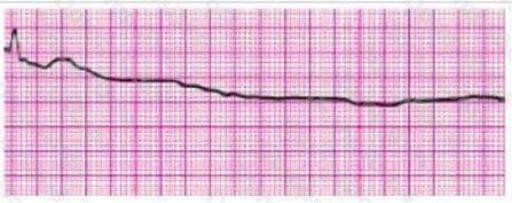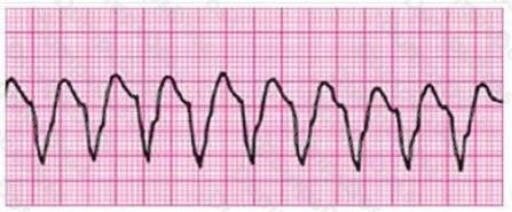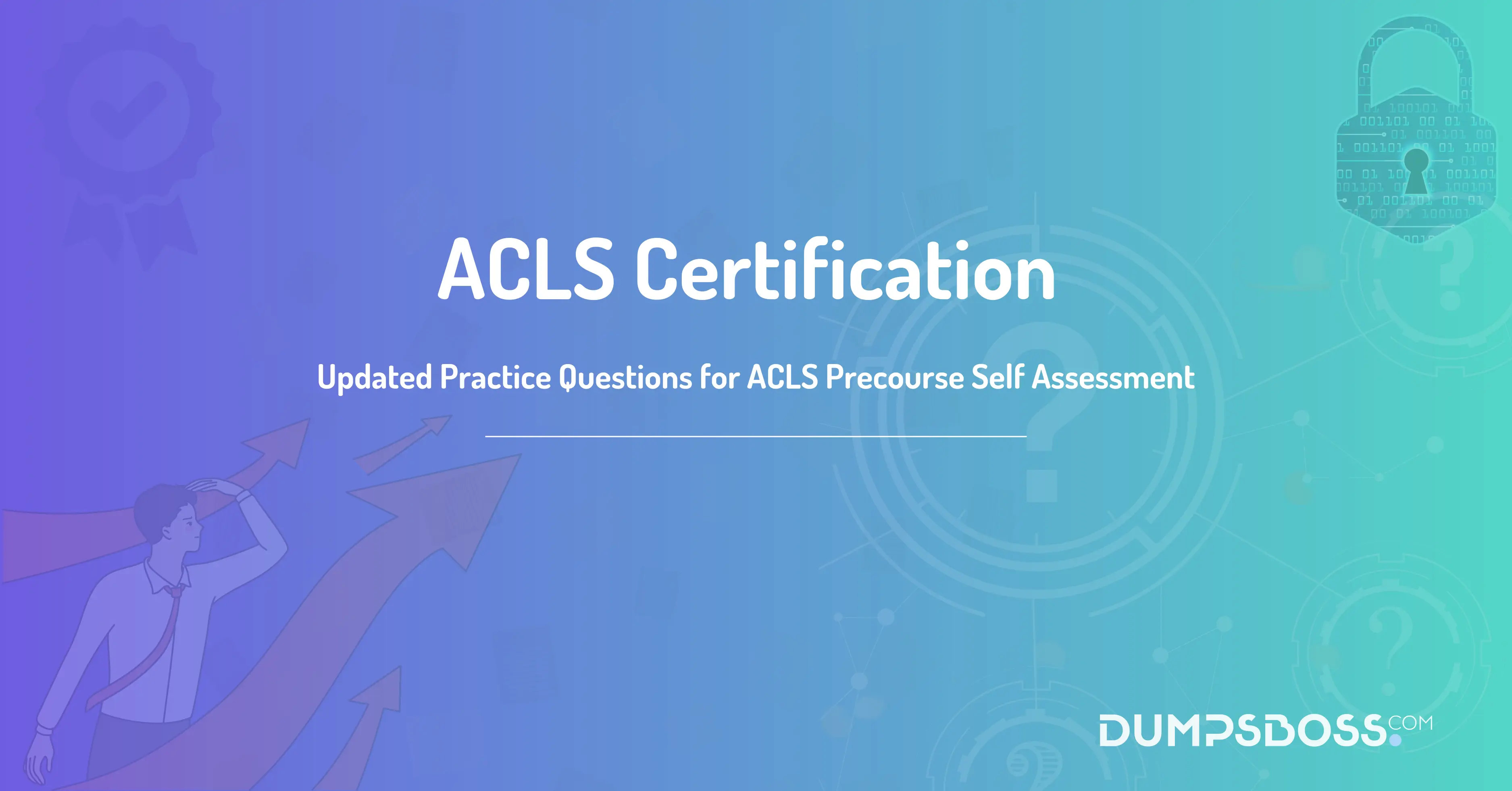What is ACLS Certification?
ACLS Certification validates a healthcare professional's ability to provide advanced life support in emergency situations. It equips them with the knowledge and skills to recognize and manage life-threatening conditions, such as cardiac arrest, heart attack, and stroke. The certification demonstrates proficiency in airway management, defibrillation, medication administration, and other critical interventions.
ACLS Certification is vital for medical professionals working in high-risk settings, such as emergency departments, intensive care units, and operating rooms. It ensures they can respond effectively to emergencies, improving patient outcomes and reducing mortality rates. Healthcare organizations widely recognize certification and is often a requirement for employment in these specialized areas.
Who Needs ACLS Certification?
ACLS Certification is essential for healthcare professionals who work in high-risk environments where they may encounter patients experiencing life-threatening emergencies, such as cardiac arrest, heart attack, or stroke.
Specifically, ACLS Certification is recommended for:
- Emergency medical technicians (EMT)
- Paramedics
- Nurses
- Doctors
- Physician assistants
- Respiratory therapists
- Other healthcare providers who may be involved in emergency resuscitation
By obtaining ACLS Certification, these healthcare professionals demonstrate their competence in providing advanced cardiac life support and are better equipped to manage critical situations effectively, improving patient outcomes.
Overview of Skills and Knowledge Gained Through ACLS Training
ACLS training equips healthcare professionals with the skills and knowledge to effectively manage life-threatening emergencies. Upon completing ACLS Certification, individuals will have gained proficiency in the following areas:
· Recognition and assessment of life-threatening emergencies: This includes identifying signs and symptoms of cardiac arrest, heart attack, stroke, and other critical conditions.
· Cardiopulmonary resuscitation (CPR): ACLS training emphasizes high-quality CPR techniques, including chest compressions, airway management, and rescue breathing.
· Defibrillation and pacing: Participants learn how to use automated external defibrillators (AEDs) and manual defibrillators to restore a normal heart rhythm.
· Medication administration: ACLS training covers the indications, dosages, and administration of emergency medications used in cardiac arrest and other life-threatening emergencies.
· Advanced airway management: Participants are taught advanced techniques for managing difficult airways, such as endotracheal intubation and bag-valve-mask ventilation.
· Team dynamics and communication: ACLS training highlights the importance of effective communication and teamwork in emergency situations.
By acquiring these skills and knowledge, ACLS-certified healthcare professionals are better prepared to respond to and manage life-threatening emergencies, improving patient outcomes and reducing mortality rates.
Importance of ACLS Certification in Healthcare
ACLS Certification is of paramount importance in healthcare as it equips healthcare professionals with the knowledge and skills to manage life-threatening emergencies effectively.
Here's why ACLS Certification is crucial:
· Improved patient outcomes: ACLS-certified healthcare professionals are better prepared to recognize and respond to cardiac arrest, heart attack, stroke, and other life-threatening emergencies. This can significantly improve patient outcomes by ensuring timely and appropriate interventions.
· Reduced mortality rates: Studies have shown that ACLS-certified healthcare professionals are associated with lower mortality rates in patients experiencing cardiac arrest. This is because they can provide advanced life support measures that can help restore a normal heart rhythm and improve survival chances.
· Enhanced professional credibility: ACLS Certification demonstrates a healthcare professional's commitment to providing high-quality emergency care. Employment in high-risk settings, such as emergency departments and intensive care units, is often required.
· Improved teamwork and communication: ACLS training emphasizes the importance of effective communication and teamwork in emergencies. This can lead to better coordination of care and improved patient outcomes.
· Legal protection: ACLS Certification provides healthcare professionals with legal protection by demonstrating that they have met the recognized standard of care for emergency resuscitation.
Overall, ACLS Certification is essential for healthcare professionals who want to provide the highest level of care to their patients in life-threatening emergencies.
Benefits for healthcare professionals and institutions
Benefits for healthcare professionals:
· Enhanced job opportunities: ACLS Certification is often a requirement for employment in high-risk healthcare settings, such as emergency departments and intensive care units. It demonstrates a healthcare professional's commitment to providing high-quality emergency care.
· Increased earning potential: ACLS-certified healthcare professionals may have higher earning potential compared to their non-certified counterparts.
· Improved patient care: ACLS Certification equips healthcare professionals with the knowledge and skills to provide the highest level of care to their patients in life-threatening emergencies.
· Professional growth and development: ACLS training provides an opportunity for healthcare professionals to enhance their skills and knowledge in emergency resuscitation, contributing to their professional growth and development.
Benefits for institutions:
Improved patient outcomes: Institutions with a higher number of ACLS-certified healthcare professionals have been shown to have better patient outcomes in life-threatening emergencies.
· Reduced liability: ACLS Certification provides institutions with legal protection by demonstrating that their healthcare professionals have met the recognised standard of care for emergency resuscitation.
· Enhanced reputation: Institutions with a strong commitment to ACLS training and certification are perceived as providing high-quality emergency care, which can enhance their reputation and attract patients.
· Improved staff morale: ACLS training can boost staff morale by providing healthcare professionals with the confidence and competence to manage life-threatening emergencies effectively.
ACLS Certification is a valuable investment for both healthcare professionals and institutions, leading to improved patient care, reduced liability, and enhanced professional reputation. DumpsBoss sample ACLS test is a lifesaver for anyone taking the ACLS exam. The quality of questions and the in-depth explanations made my study sessions much more focused and successful.
Compliance with Hospital and Regulatory Requirements
ACLS Certification is essential for healthcare institutions to comply with hospital and regulatory requirements. Many hospitals and healthcare organisations mandate ACLS Certification for healthcare professionals who work in high-risk areas, such as emergency departments, intensive care units, and operating rooms.
ACLS Certification demonstrates that healthcare professionals have met the recognised standard of care for emergency resuscitation. This is important for hospitals and healthcare organisations to ensure that they are providing the highest level of care to their patients and meeting regulatory requirements.
In addition, ACLS Certification can help hospitals and healthcare organisations reduce their liability risk. By ensuring that their healthcare professionals are ACLS-certified, hospitals can demonstrate that they have taken reasonable steps to provide appropriate training and education to their staff.
Overall, ACLS Certification is a valuable tool for healthcare institutions to ensure compliance with hospital and regulatory requirements, improve patient care, and reduce liability risk.
ACLS Precourse Self-Assessment Answers Are Designed to Help You prepare for the ACLS Certification Exam
ACLS Certification examinations are highly sought-after qualifications in the medical field. To ensure success in these exams, it is crucial to thoroughly prepare and grasp the fundamental concepts. ACLS Precourse Self Assessment Answers play a vital role in this preparation process.
These answers are meticulously designed to guide individuals through the ACLS certification exam. By reviewing these answers, candidates can assess their understanding of essential topics, identify areas for improvement, and build confidence before taking the actual exam. The answers provide a complete overview of ACLS, encompassing vital concepts such as cardiac arrhythmias, airway management, and pharmacological interventions.
These Practice Questions Cover the Core Topics Tested on the ACLS Exam, Including Airway Management, Cardiac Arrest Management, and Pharmacology
ACLS Precourse Self Assessment Answers are an invaluable resource for individuals preparing for the ACLS Certification exam. These answers provide complete coverage of the core topics tested on the exam, ensuring that candidates are well-equipped to demonstrate their knowledge and skills.
The practice questions delve into essential areas such as airway management, cardiac arrest management, and pharmacology. By reviewing these questions and answers, candidates can assess their understanding of these critical concepts and identify areas where they need further study. The answers provide detailed explanations and rationales, helping candidates to grasp the underlying principles and best practices in ACLS.
Practicing with these self-assessment questions helps candidates build confidence and familiarity with the exam format. It allows them to identify their strengths and weaknesses, enabling them to focus their preparation efforts on areas that require improvement. By thoroughly reviewing the ACLS Precourse Self Assessment Answers, candidates can increase their chances of success on the ACLS Certification exam and enhance their overall competence in providing advanced cardiac life support.
Answers to these Questions Can Help You Identify Areas Where You Need Additional Study
ACLS Precourse Self Assessment Answers are an essential tool for candidates preparing for the ACLS Certification exam. By reviewing these answers, individuals can identify areas where they need additional study and focus their preparation efforts accordingly.
The answers provide detailed explanations and rationales for each question, helping candidates to understand the underlying principles and best practices in ACLS. This allows them to pinpoint specific concepts or skills that require further reinforcement.
Identifying areas for improvement through these self-assessment answers enables candidates to allocate their study time effectively. They can prioritize reviewing materials related to the topics where they have demonstrated weaker understanding. This targeted approach to preparation helps candidates maximize their efficiency and ensure that they are well-prepared for all aspects of the ACLS Certification exam.
The ACLS Precourse Self Assessment Answers can Help You Build Confidence and Improve Your Chances of Passing the ACLS Exam
ACLS Precourse Self Assessment Answers are a valuable resource for individuals preparing for the ACLS Certification exam. By utilizing these answers, candidates can build confidence in their knowledge and skills, ultimately improving their chances of passing the exam.
Practicing with these self-assessment questions allows candidates to familiarize themselves with the exam format and question types. This helps them develop a sense of comfort and preparedness, reducing anxiety on exam day.
Moreover, reviewing the detailed explanations and rationales provided in the answers enables candidates to identify areas where they excel and areas where they need further improvement. This targeted approach to studying allows them to allocate their time and effort wisely, focusing on strengthening their weaker areas.
By building confidence and addressing areas for improvement through the ACLS Precourse Self Assessment Answers, candidates can increase their likelihood of success on the ACLS Certification exam. This not only demonstrates their competence in providing advanced cardiac life support but also enhances their overall preparedness for real-world emergencies.
ACLS Precourse Self Assessment Answers Help Prepare for ACLS Certification Exam
ACLS Precourse Self Assessment Answers are an invaluable resource for individuals preparing for the ACLS Certification exam. By reviewing these answers, candidates can thoroughly prepare for the exam and demonstrate their proficiency in advanced cardiac life support.
The self-assessment questions cover a wide range of topics tested on the ACLS exam, including airway management, cardiac arrest management, and pharmacology. By practicing with these questions and reviewing the detailed answers and rationales, candidates can identify areas where they excel and areas where they need further study.
This targeted approach to preparation allows candidates to allocate their time and effort wisely, focusing on strengthening their weaker areas. This helps to build confidence and ensures that they are well-prepared for all aspects of the ACLS Certification exam.
Furthermore, the self-assessment answers provide candidates with a sense of familiarity with the exam format and question types. This helps to reduce anxiety on the day of the exam and allows candidates to approach the exam with confidence, knowing that they have thoroughly prepared using high-quality resources.
Answers to these Questions Highlight Areas Needing Further Study
ACLS Precourse Self Assessment Answers are a valuable tool for candidates preparing for the ACLS Certification exam. By reviewing these answers, candidates can identify areas where they need further study and focus their preparation efforts accordingly.
The answers provide detailed explanations and rationales for each question, helping candidates to understand the underlying principles and best practices in ACLS. This allows them to pinpoint specific concepts or skills that require further reinforcement.
Identifying areas for improvement through these self-assessment answers enables candidates to allocate their study time effectively. They can prioritize reviewing materials related to the topics where they have demonstrated weaker understanding. This targeted approach to preparation helps candidates maximize their efficiency and ensure that they are well-prepared for all aspects of the ACLS Certification exam.
By highlighting areas needing further study, the ACLS Precourse Self Assessment Answers empower candidates to take control of their preparation process. They can focus their efforts on strengthening their weaker areas, ultimately increasing their chances of success on the exam and in real-world emergencies.
ACLS Precourse Self Assessment Answers boost confidence for exam success
ACLS Precourse Self Assessment Answers are a powerful tool for candidates preparing for the ACLS Certification exam. By utilizing these answers, candidates can significantly boost their confidence and increase their chances of exam success.
Practicing with these self-assessment questions allows candidates to familiarize themselves with the exam format and question types. This helps to develop a sense of comfort and preparedness, reducing anxiety on the day of the exam.
Moreover, reviewing the detailed explanations and rationales provided in the answers enables candidates to identify areas where they excel and areas where they need further improvement. This targeted approach to studying allows them to allocate their time and effort wisely, focusing on strengthening their weaker areas.
As candidates progress through the self-assessment questions and improve their understanding of the material, their confidence will naturally grow. This boost in confidence will translate into a more positive and successful exam experience.
ACLS Certification Signifies Competence in Advanced Cardiovascular Life Support
ACLS Certification is the gold standard for healthcare professionals seeking to demonstrate their competence in Advanced Cardiovascular Life Support (ACLS). This certification signifies that the holder possesses the knowledge, skills, and judgment necessary to manage life-threatening cardiovascular emergencies.
ACLS Precourse Self Assessment Answers play a crucial role in preparing candidates for the ACLS Certification exam. By reviewing these answers, candidates can assess their understanding of essential ACLS concepts, identify areas for improvement, and build confidence before taking the actual exam.
Individuals who achieve ACLS Certification are equipped to provide immediate and effective interventions for patients experiencing cardiac arrest or other life-threatening cardiovascular conditions. This certification is widely recognized and respected in healthcare settings, demonstrating the holder's commitment to providing high-quality patient care.
Fast Free Updates for 90 days to Cover Latest Questions “ACLS Exam Dumps” Order Now!
Sample Questions For Test Prep ACLS Exam
QUESTION NO: 1
You are performing synchronized cardioversion when the following rhythm suddenly appears.
What is the recommended immediate treatment?

A. lidocaine 100 mg IV bolus
B. begin CPR
C. unsynchronized countershock at 200 J
D. synchronized shock at 200 J
QUESTION NO: 2
Dopamine infused at greater than 10 mcg/kg/min will cause:
A. increased myocardial contractility
B. peripheral arterial vasoconstriction
C. renal artery vasoconstriction
D. respiratory depression
QUESTION NO: 3
Regarding epinephrine, which of the following statements are true?
A. increases coronary perfusion
B. IV bolus dose is 1 mg q 3-5 minutes
C. treatment for hypotensive ventricular tachycardia
D. increases cerebral blood flow during CPR
QUESTION NO: 4

Identify the rhythm by selecting the best single answer:
A. Normal sinus rhythm
B. Sinus tachycardia
C. Sinus bradycardia
D. Reentry supraventricular tachycardia
E. First-degree AV Block
F. Second-degree AV Block (Mobitz 1 Wenckebach)
G. Second-degree AV Block (Mobitz II Block)
H. Third-degree AV Block
I. Atrial fibrillation
J. Atrial flutter
K. Monomorphic ventricular tachycardia
L. Polymorphic ventricular tachycardia
M. Coarse ventricular fibrillation
N. Fine ventricular fibrillation
O. Agonal rhythm/asystole
P. Pulseless electrical activity
QUESTION NO: 5
What are the end points of a procainamide loading infusion in the non-arrest situation?
A. pretreatment QRS complex is widened by 50%
B. hypotension
C. 17 mg/kg drug has been injected
D. the dysrhythmia is suppressed
E. All of the above
QUESTION NO: 8

You are monitoring a patient. Chest discomfort has been relieved with sublingual nitrates and morphine sulfate 4 mg IV. He suddenly has the above persistent rhythm.
You ask about symptoms and he reports mild pulses, but otherwise, he is clinically stable with unchanged vital signs. Your next action is:
A. Give sedation and perform synchronized cardioversion
B. Administer amiodarone 150 mg over 10 minutes; seek expert consultation
C. Give immediate synchronized shock
D. Give immediate unsynchronized shock
E. Administer magnesium sulfate 1 to 2 g IV diluted in 10 mL D5W given over 5 to 20 minutes
QUESTION NO: 9

Identify the rhythm by selecting the best single answer:
A. Normal sinus rhythm
B. Sinus tachycardia
C. Sinus bradycardia
D. Reentry supraventricular tachycardia
E. First-degree AV Block
F. Second-degree AV Block (Mobitz 1 Wenckebach)
G. Second-degree AV Block (Mobitz II Block)
H. Third-degree AV Block
I. Atrial fibrillation
J. Atrial flutter
K. Monomorphic ventricular tachycardia
L. Polymorphic ventricular tachycardia
M. Coarse ventricular fibrillation
N. Fine ventricular fibrillation
O. Agonal rhythm/asystole
P. Pulseless electrical activity
QUESTION NO: 10
Ventricular fibrillation:
A. may be mimicked by artifact on the monitor
B. may produce a peripheral pulse
C. produces no cardiac output
D. treated with early defibrillation
QUESTION NO: 11
An incubated patient develops sudden onset narrow complex tachycardia, at a rate of 130 beats per minute. Vital signs are 0-0-0. CPR is in progress. The most important action is:
A. find the cause of the arrest
B. give 1 mg epinephrine IVP
C. give verapamil 5 mg IVP
D. cardiovert at 360 J
QUESTION NO: 12

Identify the rhythm by selecting the best single answer:
A. Normal sinus rhythm
B. Sinus tachycardia
C. Sinus bradycardia
D. Reentry supraventricular tachycardia
E. First-degree AV Block
F. Second-degree AV Block (Mobitz 1 Wenckebach)
G. Second-degree AV Block (Mobitz II Block)
H. Third-degree AV Block
I. Atrial fibrillation
J. Atrial flutter
K. Monomorphic ventricular tachycardia
L. Polymorphic ventricular tachycardia
M. Coarse ventricular fibrillation
N. Fine ventricular fibrillation
O. Agonal rhythm/asystole
P. Pulseless electrical activity
QUESTION NO: 13
In rescuing a near-drowning victim, the rescuer should:
A. compress the chest to drain water from breathing passages.
B. assure their own safety.
C. stabilize the cervical spine if a diving accident.
D. start rescue breathing.
QUESTION NO: 14

A patient with a possible ST-segment elevation Ml has ongoing chest discomfort. Which of the following would be a contraindication to the administration of nitrates?
A. Use of phosphodiesterase inhibitor within 12 hours
B. Left ventricular infarct with bilateral rates
C. Blood pressure greater than 180 mmHg
D. Heart rate 90 per minute


